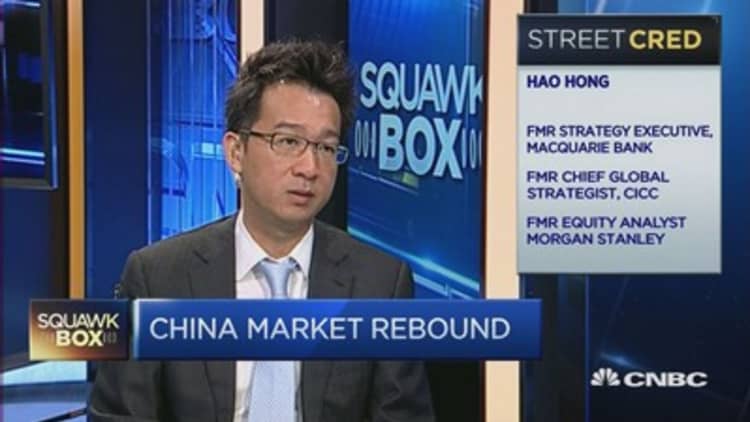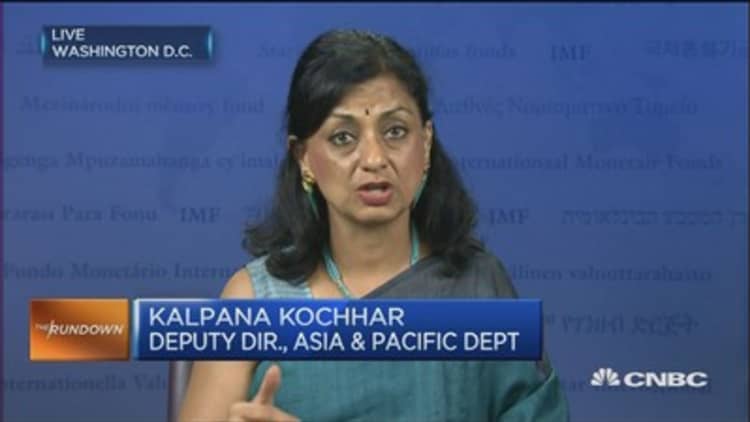A sell-off unfolded in Asia's stock markets on Friday, hit by a triple whammy of declines in offshore markets, a continued slump in commodities and soft economic data from China.
Spot gold held near its lowest level since March 2010, at $1,090.25 an ounce, in early Asian trade. Meanwhile, oil prices rebounded early Friday, with U.S. crude for September delivery trading 39 cents higher at $48.84 a barrel. Brent September crude was up 32 cents at $55.59 a barrel.
Overnight, Wall Street chalked up a three-day losing streak, with the Dow Jones Industrial Average closing about half a percent lower for the year, on the back of lackluster earnings from index majors such as 3M and Caterpillar. The lost 0.6 percent, while the tech-heavy closed down 0.5 percent.
Mainland indices fall
In a sharp reversal, China's benchmark Shanghai Composite index turned negative in the afternoon session to end down 1.3 percent, breaking a six-session winning streak, after the preliminary China Caixin purchasing managers index (PMI) surprised markets by dropping to a 15-month low in July.
Insurers, brokerages and lenders led the retreat; China Life Insurance settled 3.2 percent lower, while Haitong Securities and Citic Securities plunged 3 and 2.6 percent, respectively. In the banking space, Bank of China, China Construction Bank and Agricultural Bank of China all ended more than 1 percent lower.
The run-up for the past six sessions fueled expectations that a recovery may be in place in China's stock market, but not all analysts were convinced, given the "dichotomy in valuations between blue chips and small-cap stocks."
"[The market rout] is the worst plunge in the two decades. Along with the plunge, there was a dramatic surge in implied market volatility to levels unseen since 2008... Normally when these things happen, there tends to be a technical retrieve," Hao Hong, managing director of research & chief strategist at Bank of Communications International, told CNBC Asia's "Squawk Box."
In Hong Kong, the Hang Seng Index moved down 1.1 percent to a one-week trough.
AIA Group, the world's second-largest life insurer by market capitalization, widened declines to 1.6 percent despite reporting a 21 percent rise in the value of new business for the first half of the year, driven by strong sales in Hong Kong and China.
Casino operator Sands China continued to outperform the bourse with a 1.8 percent jump. The stock closed up 7 percent on Thursday, on the back of better-than-expected quarterly revenue.

ASX sags 0.4%
Australia's index narrowed losses to end at a one-and-a-half-week low, recovering slightly from poor data from its biggest trading partner - China - and the threat of a credit rating downgrade by S&P. The Australian dollar was battered by the news, down as much as 1 percent to $0.7267 against the greenback - its lowest level since May 2009 - earlier in the session.
Among laggards, Evolution Mining and Newcrest Mining tumbled 6.9 and 4.8 percent, respectively, while Alacer Gold retreated 4.4 percent as the fall in gold prices see no signs of abating.
Macquarie Group led losses among financials, tanking 3.9 percent, after the management said it will look to raise equity for potential acquisitions at its annual general meeting on Thursday.
"The triple combination of weak Chinese data, soft commodity prices and threat of a credit rating downgrade dragged market sentiments in Australia. We saw domestic equities getting whacked, particularly resource companies and financials, but it could have been worse if not for a mild recovery in energy and utility counters," IG's market strategist Bernard Aw wrote in a note.
Read MoreDon't be scared: Australia stocks still a buy
Nikkei eases 0.7%
Japan's Nikkei 225 tracked the negative leads from Wall Street to end lower.
Losses in the index heavyweights weighed on the bourse; Fast Retailing and Fanuc tanked nearly 2 percent each, while Softbank receded 0.7 percent. Softbank, the telecom and internet investor, is gearing up for dollar and euro-bond issuances, according to a report by the Nikkei business daily on Thursday.
Major exporters turned negative as the yen bounces into the 123 territory against the U.S. dollar. Honda Motor and Panasonic sagged 0.7 and 0.5 percent, respectively, while construction equipment maker Komatsu closed down 1.6 percent, hurt by the lackluster results of Caterpillar.
Meanwhile, the International Monetary Fund warned Japan that it needs to speed up "high impact" structural reforms and prepare for further monetary easing, economists wrote in their annual assessment of the world's third-biggest economy.

Kospi loses 0.9%
South Korea's Kospi index ended at its lowest level in nearly two weeks, while the erased earlier gains to turn weaker against the dollar, following the poor Chinese manufacturing data. The currency last traded at a three-year low of 1,167.5.
Companies with exposure to China sold off, with Samsung Electronics slipping 0.4 percent. Daewoo Shipbuilding & Marine Engineering and AmorePacific lost 4.7 and 1.5 percent, respectively.
Corporate earnings also dominated investors' attention; Hyundai Motor charged up 0.7 percent, recovering from dampened sentiment earlier in the session due to a 23.8 percent plunge in second-quarter net profit from a year earlier.
Kia Motors eased 1.2 percent after announcing a 27 percent fall in net profit for the June quarter.

